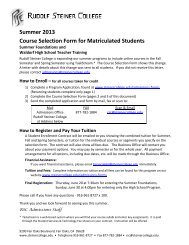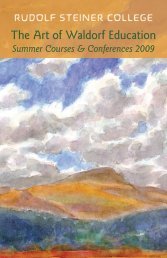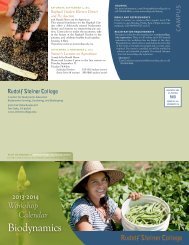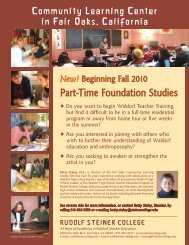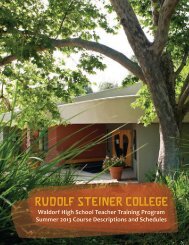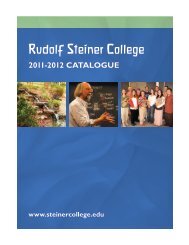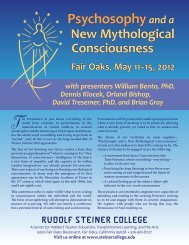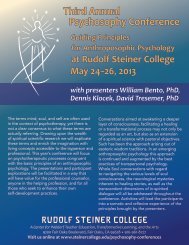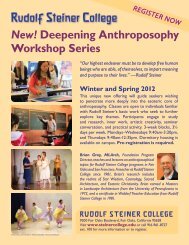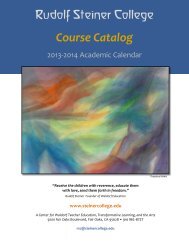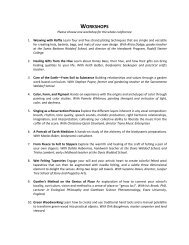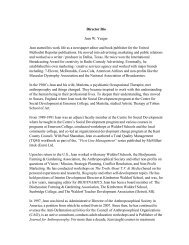The Art of Waldorf Education - Rudolf Steiner College
The Art of Waldorf Education - Rudolf Steiner College
The Art of Waldorf Education - Rudolf Steiner College
- No tags were found...
You also want an ePaper? Increase the reach of your titles
YUMPU automatically turns print PDFs into web optimized ePapers that Google loves.
16 THE ART OF TEACHING GRADES ONE–EIGHTTHE ART OF TEACHING GRADES ONE–EIGHT17Grades One–Four participants are REQUIRED to bring block and stick crayons, coloredpencils, and Choroi flutes (Grades One–Two pentatonic; Grades Two–Four diatonic). <strong>Art</strong>supplies and Choroi flutes can be purchased at the Bookstore at <strong>Rudolf</strong> <strong>Steiner</strong> <strong>College</strong>.Grades Five and Six participants are REQUIRED to bring Choroi diatonic flutes (GradeFive) or recorders (Grade Six) and colored pencils. <strong>Art</strong> supplies and musical instrumentscan be purchased at the Bookstore at <strong>Rudolf</strong> <strong>Steiner</strong> <strong>College</strong>.<strong>The</strong> <strong>Art</strong> <strong>of</strong> Teaching Grade ThreeJune 24–30 with Valerie Baadh Garrett, Antje Bojarsky, Laura Embrey-Stine,<strong>The</strong>odore Mahle, Monica Marshall, Douglas Morkner-Brown, Andrea Pronto,and Patrick Wakeford-Evans<strong>The</strong> third grader’s inner experience <strong>of</strong> the nine-year change <strong>of</strong> consciousness is reflected in thestory <strong>of</strong> the fall from Paradise. With practical, supportive classroom and home experiences, thechild can gain self-confidence for future work in our world. In this course, language developmentand math skills are woven around these themes, and nature studies focus on the practicalrelationship that human beings have with their environment. Topics include: math, music,language arts, Old Testament, painting, form drawing, speech, eurythmy, games and movement,festivals, practical advice, and working with parents. This course is designed for those who havean understanding <strong>of</strong> the principles <strong>of</strong> <strong>Waldorf</strong> education. Binder <strong>of</strong> resource materials included.Recommended reading: <strong>The</strong> <strong>Education</strong> <strong>of</strong> the Child, <strong>Rudolf</strong> <strong>Steiner</strong>.Times: Sunday 7:15pm Opening Session; Monday–Friday 8.am-8.:45pm; Saturday 8.am-1pmCourse fee: $595 through June 15; $620 after June 15Meals: Pre-register to guarantee meals. Breakfast (M-Sa) six: $48..00; Lunch (M-F) five: $71.25;Dinner (Su-F) six: $8.5.50Registration check-in: Sunday, June 22, 3-7:15pm; Monday, June 25, 7:30-9am<strong>The</strong> <strong>Art</strong> <strong>of</strong> Teaching Grade FourJune 24–30 with Valerie Baadh Garrett, Antje Bojarsky, Laura Embrey-Stine,Marianne Gray, Douglas Morkner-Brown, Andrea Pronto, andPatrick Wakeford-Evans<strong>The</strong> fourth grader is <strong>of</strong>ten strongly motivated by his or her will, which awakens after the nineyearchange. Norse mythology, with its powerfully dramatic stories and strongly alliterative andrhythmic epics, speaks directly to the child at this stage <strong>of</strong> development. <strong>The</strong> animal kingdomis studied in its relation to the human being, and geography is introduced to develop awareness<strong>of</strong> the living environment. <strong>The</strong> world <strong>of</strong> fractions leads the child from the whole to its partsand back to the whole again. Topics include: child development, mythology and English skills,the human being and the animal, local history and geography, fractions, painting, speech,eurythmy, form drawing, games and movement, practical advice, and working with parents.Binder <strong>of</strong> resource materials included.Recommended reading: Stories from Norse Mythology.Times: Sunday 7:15pm Opening Session; Monday–Friday 8.am-8.:45pm; Saturday 8.am-1pmCourse fee: $595 through June 15; $620 after June 15Meals: Pre-register to guarantee meals. Breakfast (M-Sa) six: $48..00; Lunch (M-F) five: $71.25;Dinner (Su-F) six: $8.5.50Registration check-in: Sunday, June 22, 3-7:15pm; Monday, June 25, 7:30-9am<strong>The</strong> <strong>Art</strong> <strong>of</strong> Teaching Grade FiveJuly 15–21 with Ryan Anderson, Valerie Baadh Garrett, Antje Bojarsky,Eva Cranstoun, Helen Lubin, and <strong>The</strong>odore MahleFifth grade can be a year <strong>of</strong> balance and harmony, experiencing life as the Greeks did witha focus on art, movement, and the pentathlon. <strong>The</strong> glories <strong>of</strong> ancient civilizations lead thechildren out into the world, expanding their view to a wider understanding <strong>of</strong> others and <strong>of</strong>themselves. Study <strong>of</strong> the plant world supports this expansion <strong>of</strong> the mind in a complementaryway by guiding the children to see how the earth is blanketed with plant life from pole toequator. A study <strong>of</strong> fractions and decimals focuses on the relationship <strong>of</strong> part to whole. Topicsinclude: child development, pentathlon, botany, history from India to Greece, math andfreehand geometric drawing, English skills, painting, music, speech, eurythmy, and workingwith parents. Binder <strong>of</strong> resource materials included.Recommended reading: Mythology <strong>of</strong> ancient civilizations from India to Greece; <strong>Education</strong> forAdolescents, <strong>Rudolf</strong> <strong>Steiner</strong>.Times: Sunday 7:15pm Opening Session; Monday–Friday 8.am-8.:45pm; Saturday 8.am-1pmCourse fee: $595 through June 15; $620 after June 15Meals: Pre-register to guarantee meals. Breakfast (M-Sa) six: $48..00; Lunch (M-F) five: $71.25;Dinner (Su-F) six: $8.5.50Registration check-in: Sunday, July 15, 3-7:15pm; Monday, July 16, 7:30-9am<strong>The</strong> <strong>Art</strong> <strong>of</strong> Teaching Grade SixJuly 15–21 with Ryan Anderson, Valerie Baadh Garrett, Antje Bojarsky,Mikko Bojarsky, Eva Cranstoun, Helen Lubin, and <strong>The</strong>odore MahleBy sixth grade, the methods <strong>of</strong> teaching change significantly to address new conceptual capacitiesthat are awakening in children as they approach adolescence. <strong>The</strong> challenge <strong>of</strong> the three uppergrades is particularly intense because <strong>of</strong> the increasing complexity <strong>of</strong> the <strong>Waldorf</strong> curriculumand students’ needs. At this time the teacher is encouraged to review goals, expectations, andstandards to meet the newly, and <strong>of</strong>ten chaotically, emerging individuality <strong>of</strong> the pre-adolescent.This course will address the curriculum and ways to nurture the child’s rising capacities forindependent thinking and moral-ethical responsibility. Topics include: adolescence, music, math,physics, mineralogy, English, painting, ancient Rome, Middle Ages, practical advice, games andmovement, speech, eurythmy, and working with parents. Binder <strong>of</strong> resource materials included.Recommended reading: History <strong>of</strong> Ancient Rome and Medieval Europe; <strong>Education</strong> forAdolescents, <strong>Rudolf</strong> <strong>Steiner</strong>.Times: Sunday 7:15pm Opening Session; Monday–Friday 8.am-8.:45pm; Saturday 8.am-1pmCourse fee: $595 through June 15; $620 after June 15Meals: Pre-register to guarantee meals. Breakfast (M-Sa) six: $48..00; Lunch (M-F) five: $71.25;Dinner (Su-F) six: $8.5.50Registration check-in: Sunday, July 15, 3-7:15pm; Monday, July 16, 7:30-9am



